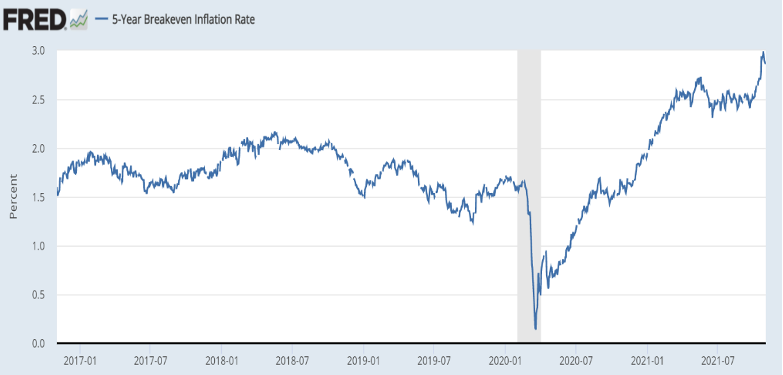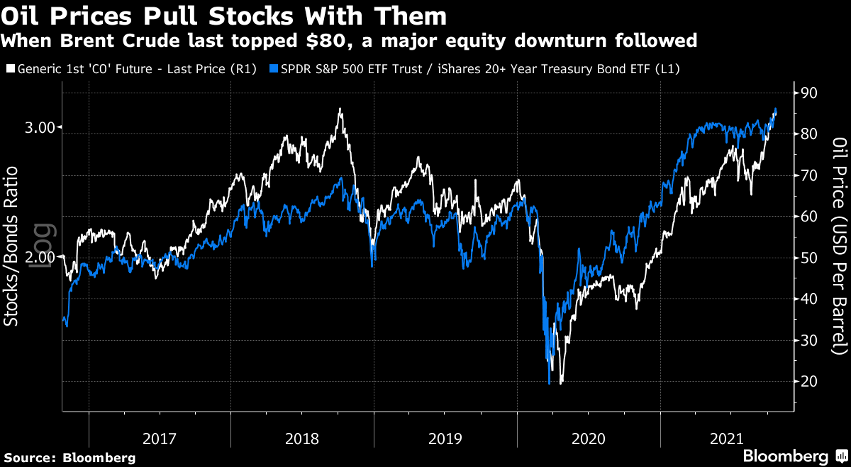Over the course of the last few days, a good chunk of the economic analysis has been focusing on the breakeven inflation rate, a.k.a. the investors’ sentiment and inflationary expectations for the next five years. The reason behind such concerns is the fact that the breakeven rate surpassed the Fed’s top inflation target of 3%, which is something that it had never done before in the last twenty years.

By the time Octavian (as he was known prior to taking the title of Caesar Augustus) was navigating the Sea of Actium in preparation for the final blow to Mark Anthony, he had defeated all his other enemies (from Caesar’s assassins whereas Brutus and Cassius ended up committing suicide after losing a decisive battle in Philippi/modern Kavala, Greece, to the conspiracies run against him by Lepidus and others, to the Sicilian blackmailing by Sextus Pompeious who was holding the Romans by their stomachs due to the food embargo he had implemented), and was now ready to end the duopoly of power that Mark Anthony was claiming.
The Day After the pandemic seems to be inaugurating a new epoch. Goethe’s Faust is the masterpiece of a lifetime. The first part’s subtext reflects the destruction of the medieval world and its replacement by a modern society. Faust is found in his study by Mephistopheles, and he is miserable. Nothing can satisfy him. He is looking for a new adventure and he finds it in the person of Gretchen, who is seduced by the freedom and abundance that Faust can provide. Gretchen sees in Faust the liberation that Europeans were seeking since Dante, Petrarch, and Bocaccio inaugurated the then Day After, a.k.a. the Renaissance. Gretchen, like all Europeans in the early 1800s, was living under feudalism, prejudices, and fear. Faust was promising an end to that system administered by a variety of special interests and sects.
Just a couple of days after the breakeven inflation rate broke the 3% threshold, even Jerome Powell (the Fed’s chairman) admitted: “Supply constraints and elevated inflation are likely to last longer than previously expected and well into next year, and the same is true for pressure on wages.” As the New Day After may be characterized by the transition to green energy and central banks’ digital currencies, the duopoly of the New Day After and the old system/economy energized by petroleum and paper money needs to find an inflection point. The duopoly (like in the case of Octavian and Mark Anthony) needs to end and a decisive turn needs to be celebrated. The New Day After demands a battle similar to the one in Actium, and Gretchen, despite her abandonment by Faust, still needs redemption.
The combination of expansionary monetary and fiscal policies along with supply bottlenecks, rising energy prices, and wage pressures, may be creating a cocktail that could darken a clear vision and obstruct the view to the path of the New Day After. Mark Anthony tried to mislead Octavian by declaring that all was well in the Parthian front (he had been promising to defeat them since the days of Caesar). The truth was very different. The Parthians had almost destroyed his supplies because of two fatal errors: first, he started the attack too late in order to finish it before winter, and second, he revealed his plans to a spy. Octavian’s sense told him that Mark Anthony was deceiving him and that he was preparing for an exodus made possible by Cleopatra. The need and the opportunity to break Mark Anthony was imminent. By defeating Mark Anthony, Octavian would end the duopoly on power that Anthony was claiming. Welcome to Actium where Octavian’s decisiveness and Agrippa’s brilliance allowed Anthony and Cleopatra’s ships to be placed in the harbor, and then by bottling them up they prevented their resupply.
From a medium-term perspective we should also observe the high correlation/co-movement between equities and oil prices over the last five years, as shown below:

Under normal circumstances, rising inflation should have boosted long-term yields, pushed real rates higher, and blown a headwind to equities. However, in the prelude of the New Day After, real yields are still negative, which in turn gives a boost to equities which, in combination with the expansionary policies, advance demand, and support profits.
The first part of Goethe’s Faust (published in 1808) symbolized the end of the Gothic world and the transition to the then Day After. The second part was not published until 1832, just a few months before Goethe’s own death. A few years later, the Industrial Revolution and the age of oil would change the world forever. In those twenty-four years of transition, Faust had lost Gretchen and as Act Four opens, we see him seated gloomily staring off at the limitless ocean and complaining to Mephistopheles that the tides move in and out in an eternal motion, accomplishing nothing. All that potential energy was being wasted. His wish? To control that energy. And the Faustian wager is in: He dares Mephistopheles to help him control the energy and monetize the Day After.
There is a catch, however: before Faust can control the energy and gain the concession to develop the coastline, he needs to help the Emperor win in a war. The Faustian bargain unfolds, and soon Faust admires the realization of his plans and dreams. The jungle and the chaos were now filled with buildings and factories churning out products and employing anyone who desires to work. But guess what? A small house owned by a beloved old couple was obstructing his view.
Actium was the decisive battle that ended the duopoly. After Actium, Octavian knew better. He started controlling events rather than the other way around. He understood the fatal consequences of hubris, he crept into the city to avoid fanfare and celebrations and became the master of denouncing authority in a way that forced the Roman Senate to give him more power and a new name: Augustus. The New Day was upon him, but the Republic had long died when he conspired to assassinate Cicero.
Faust orders the destruction of Philemon’s and Baucis’s house. The old couple may be generous and beloved, but do not desire a finer house in a newly landscaped park. Now Philemon and Baucis are dead, Faust banishes Mephistopheles who executed his wish, but deep down he knows that the destroyer is needed in order to revive that spirit of negation and make way for the future.
The infinite dreams take priority, Mark Antony’s duopoly should cease, inflation will be brought down (just check the flattening of the yield curve), and Faust now old and blind, desires to return to that old little town where he took his first steps and to have a chance to visit again Gretchen’s old little room one more time.
Welcome to the New Day After!
